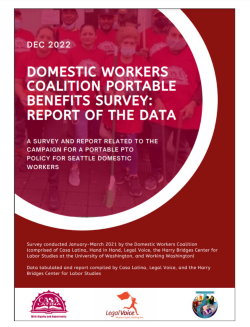Domestic Workers Coalition Portable Benefits Survey Report
A new research report released by the Domestic Workers Coalition, Domestic Workers Coalition Portable Benefits Survey: Report of the Data, finds that a Seattle portable paid time off (PTO) policy should fill a gap for domestic workers, who have long been excluded from labor protections.
The survey’s findings include that Seattle domestic workers have low access to paid leave benefits. House cleaners are an example of domestic workers who often work for multiple employers, and the survey found that only 17% of surveyed house cleaners receive Seattle’s Paid Sick and Safe Time benefit, only 12% receive paid vacation, and 75% reported receiving no benefits. The survey's findings indicate that the payment system for PTO, the accrual rate, and other details of the policy should be designed with these workers’ needs centered so that the policy can significantly increase paid leave access for those domestic workers most lacking it.
The Domestic Workers Coalition (Seattle):
In July 2018, Seattle passed the Domestic Worker Ordinance which extended the right to minimum wage, rest breaks, and meal breaks for domestic workers. It also established the Domestic Workers Standards Board which is housed in the City of Seattle’s Office of Labor Standards (OLS). In November 2021, the City of Seattle passed a resolution for OLS to form a stakeholder coalition to develop a portable paid time off benefit for domestic workers in Seattle.
The Coalition comprises of the following organizations:
Casa Latina is a non-profit worker center that advances the power and well-being of Latino immigrants through employment, education and community organizing. They have worker rights education and workforce development programming, a nationally recognized ESL program, and they organize workers to advocate for worker and immigrant rights policy change. They support workers in all industries, but their base is primarily day laborers and domestic workers.
Fair Work Center & Working Washington build power through education, organizing, and labor standards enforcement. They work to raise and uphold standards in the workplace and fight for economic and racial justice in our communities. The organization’s multiracial base includes gig and domestic workers, along with other priority industries.
Hand in Hand: The Domestic Employers Network is a national organization of household employers of nannies, house cleaners and home attendants working for dignified and respectful working conditions that benefit the employer and worker alike.
Harry Bridges Center for Labor Studies supports students and faculty at the University of Washington in the study of labor in all its facets. Through education and research, the mission is to develop labor studies - broadly conceived to include working people everywhere - as a central concern in higher education. The Harry Bridges Center cultivates connections with labor communities locally and around the world and informs policymakers about issues confronting workers.
Legal Voice pursues justice for all women and LGBTQ people in the Northwest, through groundbreaking litigation, legislative advocacy, and legal rights education.
Dr. Kim England, former Chair of the Harry Bridges Center and Professor of Geography, is one of the authors of this report. Please reach out to Dr. England at england@uw.edu with any questions regarding the report.
